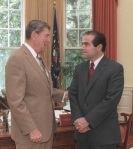 Remember Toby Scammell? The young man who allegedly learned of Disney’s plans to acquire Marvel Entertainment by peeking at emails on the Blackberry of his girlfriend, a Disney insider. His Marvel options trades ahead of the acquisition netted returns of over 3,000%. See The Blackberry Path to 3,500% Returns. When the SEC sued him for insider trading in August 2011, Scammell fought back boldly. He publicly criticized and mocked the SEC in a blog he created called “#SECFAIL.” This now defunct blog contained some funny stuff, such as this:
Remember Toby Scammell? The young man who allegedly learned of Disney’s plans to acquire Marvel Entertainment by peeking at emails on the Blackberry of his girlfriend, a Disney insider. His Marvel options trades ahead of the acquisition netted returns of over 3,000%. See The Blackberry Path to 3,500% Returns. When the SEC sued him for insider trading in August 2011, Scammell fought back boldly. He publicly criticized and mocked the SEC in a blog he created called “#SECFAIL.” This now defunct blog contained some funny stuff, such as this:
If the SEC understood how to read a bank statement or how call options worked then I wouldn’t be writing this. But this is the SEC – an incompetent government agency filled with bumbling lawyers who don’t understand the first thing about the markets they’re charged with regulating. They’re the financial regulatory equivalent of the DMV, except their lawyers lack domain expertise. I have no doubt a random selection of TSA screeners and postal workers would do a better job if their only training involved watching an hour of CNBC.
He also passionately defended his Marvel trades. He claimed his own research led to the trades, and not any information from his girlfriend who happened to be working on the planned acquisition for Disney.

Scammell in 2011
Visual Approx.
Although Scammell’s blog contained inadvertent admissions and likely only annoyed SEC attorneys, it was inspirational to watch the young man do battle with the SEC. Many observers secretly rooted for him. They admired his defiant refusal to back down, his public mocking of the agency, and the way he almost welcomed a fight against the larger, more powerful foe. He was like the Captain America of Marvel options traders.
And he fought alone!
Well, almost alone. On his side was the infamous R. Foster Winans, the former Wall Street Journal columnist, and convicted felon, who coauthored the widely read “Head on the Street” column in the early 1980s. Writing about the Scammell case for Business Insider, Winans also mocked the SEC:
The SEC has brought an insider trading case that is so trivial, so bone-headed, so absurd that you’d swear it was a piece of satire from The Onion.That it’s a real case suggests investigators at the SEC have too much time on their hands, and we should just make insider trading legal.

Winans Commenting on the Martha Stewart
Insider Trading Case
SEC Declares Educated Guessing Illegal, R. Foster Winans, 8/16/2011. As Winans reminds us, he’s something of an expert on the subject. He served 9 months in federal prison following charges of insider trading and wire fraud brought in 1985. His story is interesting.
In his columns, Winans would provide information about companies and would express his views on the performance of their stocks. His column was respected and widely read. Readers would react to the information in the columns, buying or selling the referenced stocks, and as a result, the contents of the columns could cause short-term moves in the prices of the stocks.
Two stockbrokers at Kidder Peabody realized they could profit if only they knew the contents of the columns before publication. A scheme was born when Winans agreed to provide this information to them in exchange for a cut of their trading profits. Winans shared information on 27 columns, resulting in trading profits of nearly $700,000. Winans received a cut of $31,000.
The scheme unraveled when Kidder Peabody noticed correlations between the trades of one of the brokers (and his client) and the columns. The SEC later opened an investigation. Winans and the brokers denied the scheme existed. Eventually, however, the conspirators started to quarrel with each other and Winans decided to reveal the scheme to the SEC.

Of the Current Justices Only Scalia Was on the Court for the Winans Case
Federal prosecutors then got involved. Winans was convicted of wire fraud and securities fraud. He appealed his convictions all the way to the U.S. Supreme Court. The Court affirmed his convictions in a split Opinion, and the Winans saga became a fixture in securities law textbooks.
It is unclear whether Scammell was happy to have Winans on his side. But it’s hard to miss the similarity between their respective approaches to writing about the SEC.
Despite Scammell’s valiant defiance, and the public support of the esteemed Winans, when the prospect of a jury trial came into sight, and the SEC and Scammell began their head-on drive towards each other, it was Scammell who swerved. He decided to settle. On June 6, 2012, he consented to an entry of judgment against him. He was ordered to pay disgorgement of ill-gotten gains, prejudgment interest and civil penalties, in an amount the court will later determine. It was a sad moment in David v. Goliath history. Toby Scammell Judgment. Later, in November 2013, an SEC administrative judge issued an Initial Decision barring Mr. Scammell from associating with any broker, dealer, investment adviser, municipal securities dealer, municipal advisor, transfer agent, or or nationally recognized statistical rating organization. In the decision, the judge notes that Mr. Scammell is now “remorseful.”
Scammell is Indicted
 Any relief Scammell felt from resolving the SEC’s civil fraud case was short lived. On October 8, 2013, a federal grand jury returned an indictment charging Scammell with securities fraud and wire fraud based upon his trading in Marvel options (Toby Scammell Indictment).
Any relief Scammell felt from resolving the SEC’s civil fraud case was short lived. On October 8, 2013, a federal grand jury returned an indictment charging Scammell with securities fraud and wire fraud based upon his trading in Marvel options (Toby Scammell Indictment).
This is a surprising turn of events. It has, after all, been over four years since Scammell’s Marvel options trades. Four years. And the criminal case is just beginning.
Now there are many reasons for delay, and often it is the defendant, not the government, causing the delay. But still. Starting a criminal action four years after the trades strikes many as a touch cruel, whether he’s guilty or not. The criminal matter itself will take years, if it runs its full course. Some feel this looks less like justice, and more like a war of attrition.

Attrition-Proof
(@mcuban twitter)
Regrettably, lengthy delay is a feature of our justice system. Consider, for example, the recent trial of Mark Cuban, the owner of the Dallas Mavericks, who was sued by the SEC in a civil fraud case over alleged insider trading in the stock of Mamma.com. The trial, which Cuban won, ended just a few days ago. Yet it centered on an eight-minute phone call that happened in June 2004, over nine years ago. The delay here is extreme. But Cuban is a billionaire. Attrition doesn’t work on him.
The indictment against Scammell is fairly detailed as far as indictments go. Perhaps this explains part of the delay. Maybe the prosecutors learned incriminating facts only after reviewing the documents the SEC obtained in its civil fraud case.
The indictment is also ugly. It paints the picture of a man who: (1) picked up bits of inside information from his girlfriend (or from her phone) concerning the identity of the acquisition target and the timing of the acquisition; (2) ran Internet searches on, among other things, “insider trading,” “material, non-public information,” and, ironically, “Mark Cuban”; (3) suddenly bought a large number of options on Marvel stock right before the acquisition; and (4) took specific steps to conceal the trades. In short, it paints the picture of a man who knew his actions were illegal – the essence of criminal activity. But that’s what indictments do. They paint a one-sided picture. The government still has to prove its allegations. Scammell of course has the right to defend himself. At this point, however, after years of SEC litigation, it would be astonishing if Scammell had any resources left to fight this criminal case.
Related articles
Published by Jeremy L. Bartell
 Financially Regulated is published by Jeremy L. Bartell, a long-time admirer of Wall Street and its interesting cast of regulators. Jeremy is an attorney with Bartell Law in Washington D.C. He represents financial professionals nationwide in Finra inquiries and investigations, Finra arbitration, securities employment disputes and registration and disclosure matters.
Financially Regulated is published by Jeremy L. Bartell, a long-time admirer of Wall Street and its interesting cast of regulators. Jeremy is an attorney with Bartell Law in Washington D.C. He represents financial professionals nationwide in Finra inquiries and investigations, Finra arbitration, securities employment disputes and registration and disclosure matters.






















Proposed Finra Rule May Offend Your Mother.